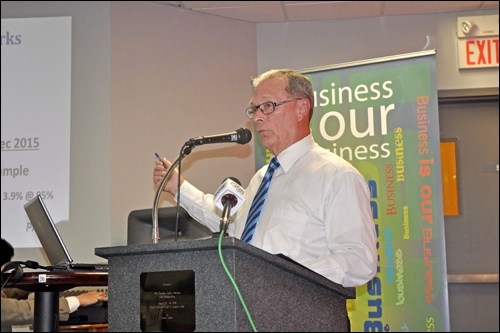It is one thing for polls to say Brad Wall’s Saskatchewan Party has a massive lead, but it’s another thing to try to break down the underlying reasons behind it.
Cam Cooper, of Praxis Analytics, tried to provide some explanation for the public mood of Saskatchewan residents – particularly when it came to viewing the Saskatchewan economy – in addressing the Battlefords Chamber of Commerce March 9 at a noon-hour luncheon.
His presentation at the Northland Power Curling Centre focused on The Saskatchewan Outlook, Saskatchewan’s Economy and Personal Well-being, the View from Street Level. The survey was conducted in early December and consisted of interviews with 633 Saskatchewan residents in all parts of the province.
While the findings of its polling among decided voters provided some indication of the political mood of the province – the Sask. Party and its leader Brad Wall had 63 per cent support compared to the NDP’s 24 per cent, nine per cent for the Liberals and three per cent for the Greens – the main goal of the survey was to measure perceptions of the Saskatchewan economy.
The survey was detailed and broke down responses based on regions, ages, income levels, how long respondents have lived in the province and other factors.
The general takeaway from the results was Saskatchewan residents were reasonably happy about their own personal economic situation, but less so when it came to their perception of the province.
Participants in the survey were asked to rate on a scale of one to five how they felt the provincial economy was doing.
Residents rated the economy at 3.27, down from 3.65 a year ago. That is just above the survey median and firmly in positive territory, but down 38 points from a year ago.
When asked to measure their own personal economic situation the result was 3.32. That was unchanged from a year earlier and actually better than how residents felt about the provincial economy.
The survey also measured the public reaction to immigration and refugees. The general perception was positive. Praxis reported 74.1 per cent felt people from other countries add new flavour, 61.5 per cent felt they add new taxpayers, 56.1 per cent believed they filled vacancies (as opposed to taking jobs away from Canadians) and 69.9 per cent believed immigrants should be hired if Canadians were unmotivated or unqualified for the positions.
But there was less support in December for the Liberal pledge to bring 25,000 Syrian refugees to Canada within three months. That drew a rating of 2.78, below the median.
As well, on the issue of supporting higher taxes on items that produce greenhouse gases, the response was also negative with a rating of 2.64. Opposition to a carbon tax like Alberta’s was also high, at 68.9 per cent.
When measuring who would be the best premier, the results proved interesting. Brad Wall ran ahead of his party at 75 per cent (compared to 63 per cent party support). But Cam Broten scored only 18 per cent on that question, running behind his party’s 24 per cent.
“I’m a little bit surprised on those numbers on Broten,” Cooper admitted. But Cooper said he’s tallied these results two or three times, and other pollsters have as well.
Cooper told reporters Broten would be expected to be a benefit to his party “because he’s presentable, he can speak in policy terms. I think he’s got the credibility, but for some reason the traction doesn’t seem to have occurred yet.”
Cooper spoke about what the economic perceptions meant with respect to voter intentions.
Cooper said he has to go by what the numbers tell him.
“They say ‘we’re back a bit, we’re not into the ditch yet,’ and it doesn’t seem to have attached to the provincial government. They’re going to get some of the blame, but they’re not getting it in a consequential way that shows up in the numbers.”
As for what the numbers meant specifically to the parties, it’s obviously good news for one in particular.
“I think the Sask. Party can go away with a smile, but shouldn’t get too confident,” Cooper said.
“Because the campaign does matter, the candidates do matter and things can change. But if you look at the pattern over the four-year period, despite whatever’s happened there hasn’t been much shift in the numbers.”
As for the NDP, “they’re going to need to find a way to move attention on the economy, which is the big issue, into their bailiwick, to gain the confidence of the public that they’re going to be able to do better than the Sask. Party has. And it doesn’t seem to be there – the numbers don’t suggest that people have blamed the Sask. Party for the resource price. At least not yet.”



